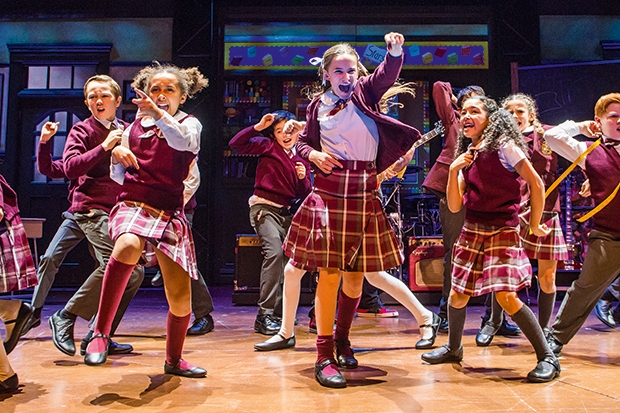Who could resist School of Rock? For me it was a chance to see a heavy-metal musical written by the best-known headbanger in the House of Lords, Julian Fellowes. The movie features Jack Black as a failed rock guitarist who bluffs his way into a private school and turns a class of robotic snoots into a prize-winning band. It’s one of the most joyous stories ever filmed. This version, faithfully scripted by his lordship, rises to the same level and delivers a night of sheer rapture. The thing is like a drug. Every performance sends skyrockets of happiness zinging up and down your spine.
David Flynn has an echo of Jack Black about him but he brings added stores of charm and humour to Dewey. Preeya Kalidas is wonderfully nasty as Ned’s hideous girlfriend, Patty. Miss Mullins is played by Florence Andrews, who uses her opera training to add some hilarious quotations from Mozart. And yet she finds the melancholy and isolation of the former party girl forced to play the role of control-freak headmistress. The greatest laurels belong to the kids. Their musicianship is astonishingly assured and the rock genre carries the show to a new plateau, the realm of the magical. I could hardly believe my eyes as I watched little Selma Hanson, as Katie, strapping on a Gibson EB-3 (which looks longer than she is) and hammering out a bass riff that made my molars throb. Amazing Tom Abisgold seems not much older than 11 but he flings himself across the stage playing a starburst electric guitar with all the dexterity and exuberance of Hendrix. When he collapsed on to the boards while cranking out a ‘face-melter’ of a solo I wasn’t sure if he’d fallen deliberately or was improvising his way out of a mishap. He didn’t stop playing. People didn’t stop cheering.
At the show’s climax, the contrite parents rushed into the auditorium to applaud their kids in the ‘Battle of the Bands’. And the whole house leapt to its feet. I’m not sure I’ve seen a more powerful finale to a theatrical event because the act of transformation represented is so vast, so unexpected and so thrillingly achieved. And the life lessons are sublime. Children, this show tells us, are honest, wise and good. Their parents are foolish, wrong and malign. Truth is found in play, not work. Creative anarchy beats copycat conservatism every time. Class kills, but life liberates. This is the finest musical I’ve ever witnessed. And there’s a bonus in store. Children who see this show may never want to go back to school. For fee-paying parents it could turn out to be quite a bargain.
J.B. Priestley’s An Inspector Calls is a class-war whodunnit. We’re in the fictional town of Brumley, somewhere in the northern griminess of Edwardian England, where society is divided between the upper-crust parasites and the decent, upstanding toilers beneath them. Depressing stuff. Worse still, Brumley has just witnessed a spate of offences against the underclass that can be traced to the affluent Birling clan. The chargesheet is read out by an all-knowing policeman who gatecrashes a supper party and forces Birling after Birling to admit their complicity in the local crime blip. A factory hand was fired for political activism. A haberdasher’s girl got the sack because her looks provoked jealousy among female customers. An unmarried skivvy was impregnated by a wealthy gadabout and when she applied for help to a charity she was told to get lost by a wrinkled old battleaxe. The desperate mum-to-be ended her own life.
The cast give this formulaic grinder a reasonable shot. Excellent Barbara Marten gets some much-needed laughs as the ghastly old boot Sibyl. Clive Francis is decent as Arthur, the pompous, snobbish patriarch. Diana Payne-Myers does well as an unlettered serving wench who, being a scrubber with a mop, has no lines to speak. Liam Brennan is a mite too bitter and shouty as the smug inspector. Preening his chops and stroking his burgeoning paunch as he guzzles back the champers, Matthew Douglas gives an excellent account of the dastardly, self-satisfied, two-faced philanderer Gerald.
These personalities, as you can see, are drawn from a sample book of sub-Dickensian stereotypes. The narrative is as quaint and outdated as the characterisation. Brumley’s ethics make no sense to a modern world where contraception, sexual tolerance and employment rights are universal. And while the play can’t be faulted as an indictment of an extinct moral code, it offers little in the way of entertainment or revelation. It accuses Edwardians toffs of being Edwardian toffs and finds them guilty. The world première was staged in the USSR, in 1945, where it doubtless enjoyed the endorsement of Stalin. I doubt if a show co-produced by Pol Pot would reach the West End.







Comments